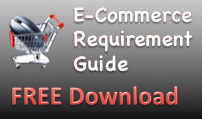 The popularity of ecommerce sites has grown exponentially in recent years. In the past, online shoppers were likely to be satisfied with an engaging product deal, but now they are also expecting a seamless shopping experience. Unfortunately, even a small error in the buying process can prompt ecommerce site users to abandon their cart and shop elsewhere. We've provided an overview of a few mistakes you should avoid while you are optimizing your website for shoppers, and developing a strategy for long-term success.
The popularity of ecommerce sites has grown exponentially in recent years. In the past, online shoppers were likely to be satisfied with an engaging product deal, but now they are also expecting a seamless shopping experience. Unfortunately, even a small error in the buying process can prompt ecommerce site users to abandon their cart and shop elsewhere. We've provided an overview of a few mistakes you should avoid while you are optimizing your website for shoppers, and developing a strategy for long-term success.
Assuming That Traffic Equals Sales
This mindset has driven many ecommerce site owners insane over the years. Consider this, though: if your site is not designed to convert traffic properly, then it won’t matter how much traffic you drive to your site. You need to develop a keen understanding of your target market, so you can engage with your ideal customer demographics. Basically, you want to increase the right type of traffic to your site, bringing in users who are ready to convert; otherwise, what’s the point of driving uninterested people to your site?
Pages Aren’t Optimized For Conversion
If your potential customers can’t intuitively navigate past your product page (to the checkout), they won’t ever have a chance of entering the checkout process. It's beneficial to include high quality photos of your product, as they can help to boost conversion rates. If you can show the products from different angles, while offering the ability to zoom in, even better. Product descriptions are important too, as they should offer buyers enough information to decide if they want to purchase.
Purchasing Policies Aren’t Visible
Customers will want to know what happens if your product does not suit their needs, who to call if they have questions, and what your policies are in general. An effective website will inform its customers of its return policies, customer service hours, FAQs, delivery dates and more. Don't make your customer look around for these answers. Have them readily available and easily accessible. Sure, this won’t necessarily affect your conversion rate; however, happy customers are often returning customers.
Your Site Isn't Optimized For Mobile Devices
More people are using mobile devices to search and shop online each year. In 2015, responsive site design is a requirement for each ecommerce site, at least if you want success. In fact, according to a Marketing Land post, "traffic from mobile devices is now 50 percent of overall online U.S. retail traffic” (Source). So make sure that your sight is designed to be compatible with small screen sizes. Mobile device users also find the "look and feel" of a site to be an increasingly important factor for their purchasing decision. So, if you have an ecommerce site, which is not optimized for mobile shoppers, you are missing out on a lot of potential sales.

